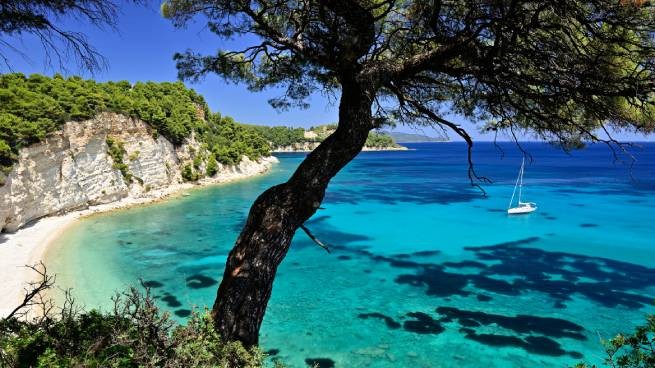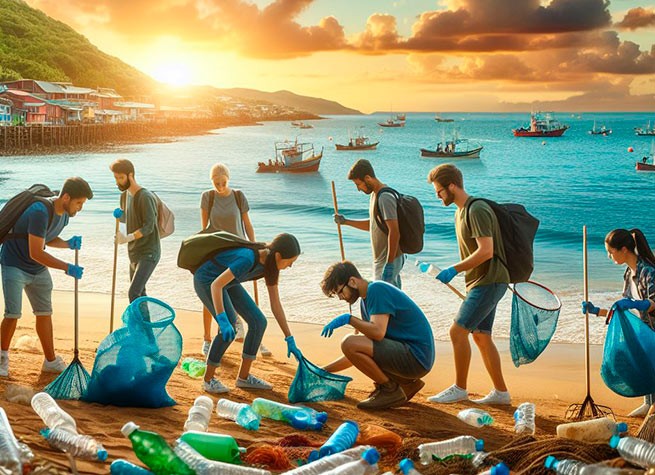Marine biodiversity protection in Greece is declining at the fastest rate in Europe, report says EU “State of Nature 2020”.
It is not exempt from the overfishing that devastates the oceans, it directly threatened by invasive speciesand the lack of protection accelerates this deterioration…
At this point it should be clarified that Greece has some of the richest and most diverse marine ecosystems in Europe. With a coastline of over 15,000 km (3rd largest in Europe) and over 6,000 islands and islets, it features a rare diversity of morphology and life, with extensive seagrass beds and reefs, thousands of species of fish, shellfish, sea turtles, seals, dolphins and whales.
The paradox is that although almost 20% of Greek seas are protected (Natura 2000 sites, national marine parks), less than 1% of Greek territorial waters are strictly protected, and most of these areas do not yet have management plans.
Please note: In December 2020, Greece was convicted by the Court of Justice of the European Union for violating its obligations under Directive 92/43/EEC by failing to timely set appropriate conservation targets and measures for sites of community interest.

Two new marine parks
Twenty pledges for the protection of the marine environment will be announced during the international conference “Our Ocean”, which takes place from today to Wednesday 17 April at the Cultural Center of the Stavros Niarchos Foundation. Two of them were recently announced and concern the creation of two marine parks in the Ionian and Aegean Seas.
At the same time, nine environmental organizations (Greek Ornithological Society, Pelagos Institute of Ketological Research, Blue Sea Foundation, Cyclades Conservation Foundation, Greenpeace, iSea, MEDASSET, Thalassa Foundation, WWF Hellas) noted in a joint statement that the announcement of the creation of two national marine parks in the Ionian and Aegean Seas is an important initiative, especially given the exceptional ecological value of these areas.
However, they argue that for this commitment to respond to the need to protect marine biodiversity, critical issues such as the boundaries of areas, their institutional status and permitted uses need to be clarified and specified. According to environmental groups, the most pressing issue in the case of the Ionian Sea concerns the hydrocarbon exploration and development concessions that have been awarded in the area.
“A ban on this extremely harmful activity would be a necessary and appropriate – both from an environmental and purely economic point of view – political initiative. After all, there is no such thing as a marine protected zone with hydrocarbon production. Equally important is the adoption of specific measures to regulate shipping to reduce the number of collisions between ships and marine mammals and a ban on military sonar exercises“, their joint statement said.
Hunger and acid seas
And because the numbers are never wrong, experts predict that for every degree Celsius of warming, global catch potential will fall by more than three million tons. What does this mean? Hunger for millions of people. Developing countries located in lower latitudes, where warming is happening faster, will lose up to 50% of their annual catch!
Meanwhile, seas around the world are becoming warmer and more acidic every day due to climate change, according to experts, affecting the lives of billions of people. If we talk about the acidity of the sea, then, according to experts, by the end of the century it will increase ten times faster than at any time in the last 55 million years.
An integral part of
“Our Ocean” – this is the name of the international conference. For those who don't know, the oceans cover over 70% of the planet's surface and contain an incredible diversity of plants and animals, with an estimated over 300,000 species known to us. Oceans, seas and coastal zones are the most important and integral part of the planet's ecosystem.
In addition, the oceans are the main climate regulator – they change the Earth's temperature by absorbing solar radiation, which they accumulate in the form of thermal energy. Ocean currents distribute this thermal energy throughout the Earth. They also absorb 30% of the carbon dioxide that humans are responsible for releasing. Scientists predict that warmer oceans will make storms, hurricanes and tropical cyclones more intense in the future, increasing the likelihood that they will reach category 4 or 5 on the Saffir-Simpson scale.

Threat to humans
The oceans provide us with many benefits, they are home to 80% of life on Earth, but only 1% of their surface is under some kind of protection, while many other marine species are lost forever or are on the verge of extinction.
The reason again lies in the human threat: overfishing, pollution, climate crisis… As for overfishing, modern intensive fishing has led to the disappearance of fish stocks in many of the world's seas, given that global fish production has quadrupled in the last 40 years.
But this does not mean that fish stocks have increased. This simply means that the efficiency of fishing gear has increased and, of course, the size of the fleet. Between 65 and 70% of commercial fish in Greece, such as hake, cod and swordfish, are overfished. 90% of the adults have already been caught, but the areas of the Mediterranean Sea where these fish breed remain unprotected. A kilo of fry sold on the market today, if left to grow, will weigh about 50 kg in two years.







More Stories
Weather: hot and windy weekend
Blue Flag: 22 Greek beaches stripped of honorary label
What Are Cruise Ships Worth for the Planet (Video)